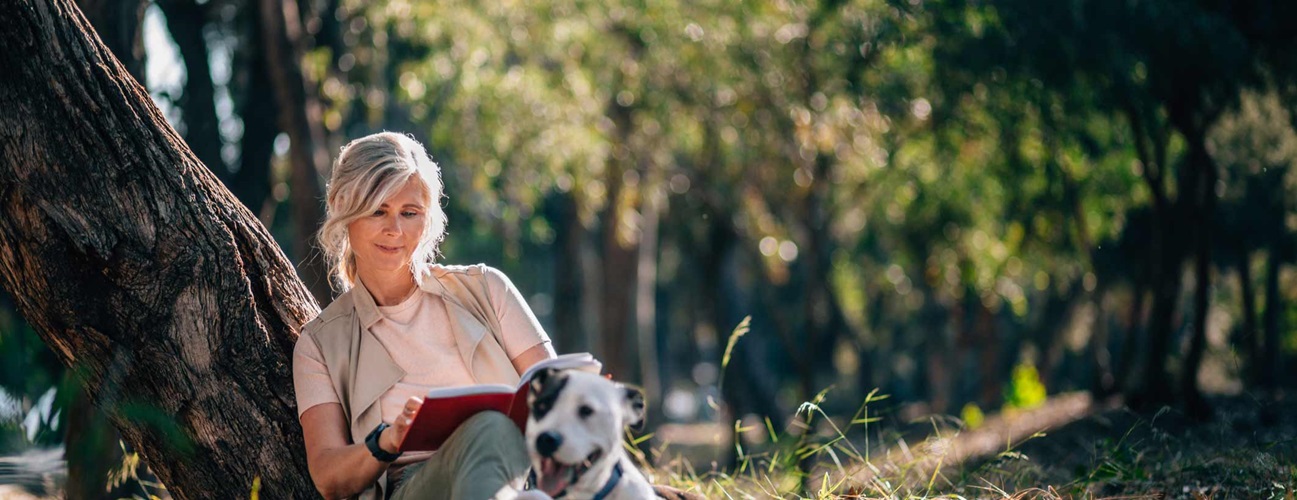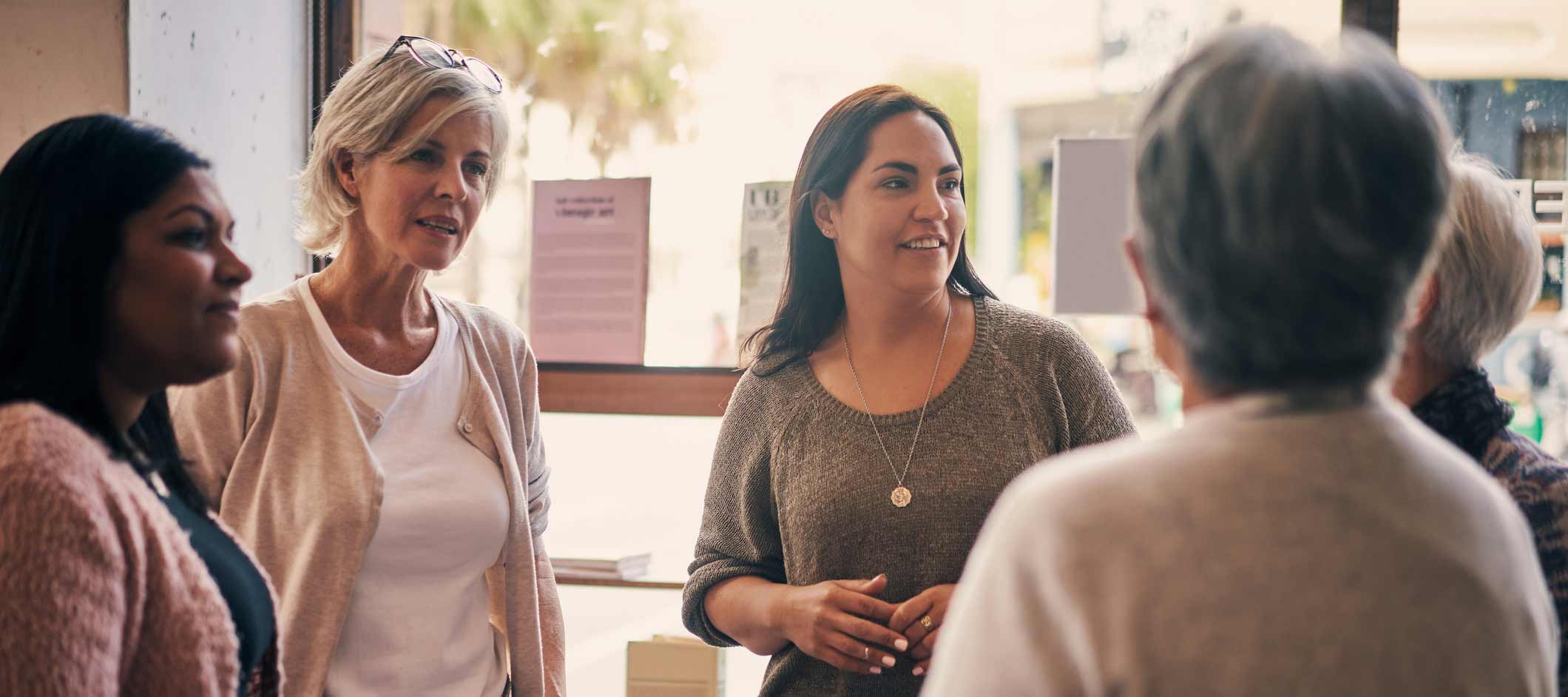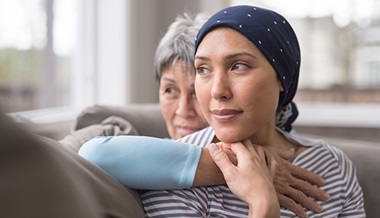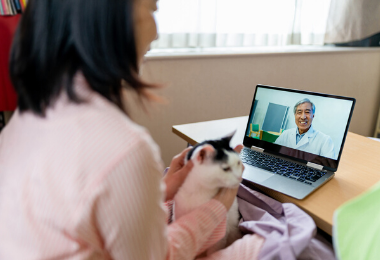Treating Breast Cancer in People Age 70 and Up
Featured Expert:
Older age increases the risk of several types of breast cancer. But advancements in diagnosis and highly individualized treatment plans are increasing the odds of recovery for older patients and making it possible for many to live longer, healthier lives.
Breast surgeon Hanh-Tam Tran, M.D., explains what people age 70 and older should know about being diagnosed with breast cancer and why there’s reason for hope.
What You Need to Know
- According to the National Cancer Institute, women 70 and older have a 1 in 24 chance of developing breast cancer at some point in their lives. Men can also get breast cancer.
- Treatment — which could include surgery, hormone-blocking pills, targeted radiation or a combination of these therapies — depends on the characteristics of the tumor. Chemotherapy is used occasionally.
- Healthy, active, independent patients have the best chance of a good outcome.
Common Breast Cancers in Older Adults
The most common cancer diagnosed in this age group is invasive ductal carcinoma, or IDC , followed by invasive lobular carcinoma (ILC) . These cancers arise in different tissues of the breast, but are treated in similar ways.
Most invasive cancers in this age group are hormone receptor positive. Hormone-positive breast cancers are considered slow-growing tumors, which can mean a good overall prognosis.
Individualized Breast Cancer Treatment for Older Adults
Tran says her group’s approach to dealing with breast cancer in patients of any age is highly individualized. “We recommend both the treatments and the order in which the patient will receive them, which is very important. For instance, radiation is not common before surgery, since it makes wound healing more difficult.”
She notes that most cancers are found early, and generally surgery is the first step in treatment. But for cancers that are more advanced when they are diagnosed, starting out with chemotherapy can offer some advantages.
“In cases where the cancer is advanced, chemotherapy is often done first to shrink the tumor. Another benefit of doing chemotherapy first is the tumor’s response to the chemotherapy gives us information on your prognosis, and surgery afterward can confirm those findings.”
Breast Cancer in Patients Age 70 and Older: Questions and Answers
What is the best breast cancer treatment for older patients?
In gauging which treatment might be best for an individual, Tran looks at the characteristics of the tumor. This can help identify tumors that are likely to respond to hormone-blocking therapy alone and those that may respond to other modes of treatment.
Genomic breast cancer tests (also known as oncotype tests) can map the genome of the cancer cells and help reveal their sensitivity to hormone-blocking treatment, chemotherapy or both. Though Tran says oncotype tests are not appropriate for every patient, for some people with invasive cancers that are larger than 0.5 centimeters and estrogen positive, the tests can provide information on how likely a particular cancer is to return after therapy.
Tran says that in late 2019 and early 2020, genomic tests for breast cancer were improved, and they can now yield clues on more advanced breast cancers, even those that have infiltrated the lymph nodes. Using these data, your doctor is better prepared than ever to recommend a treatment plan to bring breast cancer under control.
Do larger breast cancer tumors always require a mastectomy?
No, not always. Tran says some large tumors do not require mastectomy. “The surgical decision for lumpectomy versus mastectomy is determined by the tumor’s size relative to the size of the breast. Lumpectomy would likely be feasible for a 2-centimeter tumor in a person with very large breasts, but mastectomy would be recommended for the same tumor size in a person with small breasts,” Tran explains.
If I have invasive breast cancer, do I have to have a mastectomy?
Mastectomy is one treatment for invasive breast cancer, but it isn’t required in all cases, Tran says, especially now. “Which treatments your doctor recommends — and the order in which they’re given — depend on several factors.
“For example,” she says, “You and your doctor may decide that the best option for you is to undergo chemotherapy first. Chemotherapy can shrink the tumor and melt part of it away, so it is small enough to be managed with a lumpectomy instead of a full mastectomy.”
If surgery is the best choice for you, new advancements for breast-conserving surgery (lumpectomy) and mastectomy with reconstruction can offer alternatives that preserve your appearance and self-image, such as oncoplastic breast reduction, nipple-sparing mastectomy, aesthetic flap closure and other techniques.
Will I have to have chemo if I have breast cancer?
Tran says chemotherapy can be an effective way to reduce the size of a tumor, but admits the regimen can be tough. Depending on your individual situation, chemo is not always necessary.
“For postmenopausal patients with invasive cancer where the tumor is greater than 1 centimeter and hormone receptor positive, the information we get from the oncotype genetic profile of cancer can help predict if chemotherapy will be beneficial,” she says.
“If tests come back with a low score for certain factors, even if there’s cancer in lymph nodes, the patient may be able to skip chemotherapy and instead receive hormone-blocking treatment, which is easier to take and involves fewer side effects.” Tran says hormone therapy is given over five years, and can be administered in pill form.
If breast cancer has spread to my lymph nodes, do they all have to be removed?
Not always, says Tran. “We are performing fewer axillary (underarm) lymph node removal surgeries now. Just a few years ago, if you came to me with breast cancer that had spread to the lymph nodes, those nodes would all have to come out, which raises the risk of lymphedema.
“Recent studies have found that for some patients with cancer in their lymph nodes, radiation to the remaining lymph nodes may control local cancer as well as axillary lymph node dissection — removing all of your lymph nodes.
“Another way to avoid axillary dissection is to shrink the cancer with a course of chemotherapy first. If there is a good response, we can remove fewer lymph nodes.”
If I’m 70 or older, will invasive breast cancer be fatal?
Though a cancer diagnosis is scary at any age, older adults may feel more vulnerable. But Tran says there are reasons not to panic.
“In patients 70 years old or older, most of the time, the invasive cancer is hormone receptor positive, which means it is a slower-growing cancer.
“Most patients treated for invasive breast cancer survive,” she says. “Even when you are diagnosed at an older age, you can successfully complete your therapy, go on living and eventually die from causes other than breast cancer.
“This is especially true for those who are in good general health at the time of their diagnosis and who are able to care for themselves.”
A Team Approach to Breast Cancer Treatment
Tran says older patients — or anyone diagnosed with breast cancer — can benefit from getting care at a comprehensive center, such as the one where she performs surgery: the Sullivan Breast Center at Sibley Memorial Hospital in Washington, D.C.
“Our team meets weekly to discuss individual patients’ cases, and that helps us bring the best thinking to each person’s treatment plan,” Tran says. “Our combined experience supports every patient.”







